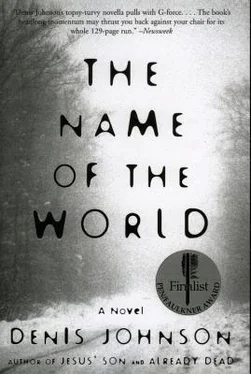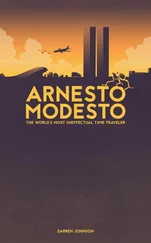“It’s for sale.”
“What’s the price of one of these things?”
“Drive it.”
“I just did.”
“Drive it, man. Keep it a couple days. Let’s talk. It’s for sale and I want you to have it and it’s for sale.”
Ted’s home was made of red brick. It had a small entry with white pillars, and a semicircle drive, also small, but there they were, the entry and the drive, saying, “This wants to be a mansion.” To the side stood Ted’s blond ten-year-old son in a white T-shirt and white shorts, puffing flagrantly with large gestures on a cigarette that wasn’t actually burning. The player of the lute. Ted got out scolding and laughing. He grabbed his son’s cigarette and tossed it aside and it bounced on the tight green crew cut of the lawn. Together they went into the house.
I held the steering wheel and tromped the accelerator of my new car. The decision was made as soon as the suggestion. I put off admitting it to Ted or even to myself, but the car was mine.
I took Eloise to her place across town. On the way I asked her if she’d been getting a lot of painting done, and she told me not much. “The catering’s slack, and then I paint less. For some reason I work harder when I’m working harder. I’m practically on vacation. I couldn’t keep up with any business anyhow. There’s nobody experienced around to help me but Phil and Flower.”
“That would be Flower Cannon maybe.”
“Yes. She’s — you know her. Have you had her?”
“Hey. Eloise.”
“As a student, Mike.”
“We’re acquainted. I don’t think she’s interested in history.”
“No, I wouldn’t think so. This summer she’s the mad cellist. They’re getting together some kind of chamber group, I don’t know. This is my place. What do you think of this contraption?” She meant the car.
“It’s fine. I haven’t driven in years. Anything’s going to feel funny.”
“A BMW can’t feel that funny. How many miles? Ah, plenty.” She was leaning over and peering at the odometer.
“If I don’t wreck it by tomorrow, I guess I’ll buy it.”
“Buy it now! The asshole’s drunk!” She kissed my cheek and got out.
“Do you run into Flower much, or not?” I asked her out the window.
“Flower? No.” She both squinted and leered now. She had a limber face! “Are you after her?”
“After her? Wow. You’re frank as hell, aren’t you?”
“Usually I’d warn a young girl away from the prof. But in this case it’s you who’d better take warning, pal.” She leaned down and spoke with burnt tobacco and peppermint schnapps on her breath. “I am your pal, you know. In the end it’s the likes of us who’ll be stuck with each other.” She stood up and addressed the population generally: “You’ll end up marrying me, the Froggy Bitch with too many cats and a drinking problem every summer! And you’ll thank God!
“At least you’ll have a ritzy car!” she called after me as I drove away.
I had a vivid and disturbing dream that night that sent me out of my bed and down to the kitchen in my bathrobe to putter distractedly there until dawn. I think to recount your dreams is to bore the entire world, and I don’t normally even trouble myself to recollect mine. But since it’s developed, I think we can agree, that the knots in this line, the handholds, are those moments having to do with Flower Cannon, I’ll tell about this one. I’m following Flower Cannon through bureaucratic hallways — the sort of place you find yourself in from time to time with a form in your hand, looking for an office where someone will take this thing and make sense of it, but I had no document, I had only this vague feminine figure somewhere ahead of me as a reason for my wandering. She disappeared in her white garb through a door halfway along a corridor. I now understood that this was a hospital, understood without having wondered, in the state of senility common to the dreaming mind. I followed her through the same door and walked out onto a glaring stage before a vast, shadowy audience of students. My quarry — yes? or my grail? — lay naked on a gurney while a doctor pointed his finger at her breasts and vagina and lectured unintelligibly. I didn’t belong here. My shame was like a child’s. I woke up sweating and chilled with panic. Instantly the words Ted MacKey had sung that afternoon came back:
I went down to St. James Infirmary
And I saw my baby there.
She was stretched out on a long white table,
So still, so cold, so bare.
As I’ve said, dreams are nonsense. But this one was a lot like something that actually happened the very next day. Around four that afternoon I was at the supermarket picking up a few items I probably didn’t need urgently. (I like wandering the aisles and coming up with a couple of days’ menu, just improvising. Then I let the stuff rot at home while I have myself fed in restaurants.) I was standing in the checkout lane reading the headlines of Midnight and Globe and the National Enquirer, trying not to take to heart the messages of the tabloid press: The mighty are fallen; glamor equals misery; the innocent shall be raped and killed. And then I saw Flower Cannon, hunched and straight-armed, shoving along a shopping cart.
She was all dressed up in a black-and-white pantsuit with pads that gave her sharp shoulders. Ankle-high white booties on her feet. The first strong impression was that of a crew member in a science-fiction tale. I waited just outside the store, hoping to say hi, but she came out the other exit. I trailed her through the parking lot and called her name, but she didn’t acknowledge this man in a baking blacktop car park, brown paper bag of groceries dangling at his side in a single-handed grip, shouting, “Flower! Flower!”
I stood watching while she got aboard her hatchback, and then I went to my new used German and followed her. I was living last night’s dream, only in a setting not of hallways but of shimmering black streets.
Flower wasn’t going fast. I could have pulled alongside and signaled, but I didn’t. We went about a mile out the Old Highway and then left onto a narrow concrete road that shot west with never a turning through fields of alfalfa, fields of barley, fields of knee-high rows of corn.
I kept the windows down. The world was mute and pungent, brilliantly green. A few miles along Flower turned left again into the gravel lot of a gray one-storey building and parked among a lot of other cars gathered together in the midst of this flat vastness. Nothing else to see but a distant pair of concrete grain elevators standing above the horizon. Every small sound came up crisp and then the breeze took it far away, the small steady wind across the crust of the world, the click of her door and her heels and toes on the gravel. Flower glanced my way without curiosity as she headed into the place.
It was a cheap structure almost on the order of a mobile home, but much larger inside than it had seemed. A wide hallway went either way out of a foyer where scores of people stood around without having to crowd. A sense of offices, meeting rooms, classrooms down institutional corridors. Directly ahead, double doors opened onto a chamber big enough, from what I could see, to accommodate hundreds. I thought I glimpsed church pews. Folks were wandering inside there to sit. I spotted Flower easily among all the farmers and the farmers’ wives. She stood by the double doors in her black-and-white pantsuit, maybe a bit harlequinesque but very stylish and expensive looking, talking in sign language with a young boy about sixteen. He must have been a deaf boy. I was fascinated. Without voices to help them they used whatever they had, both their faces animated, exploding with emotion, while the quick lively gestures shot down their arms and out their fingers; they worked at it like silent-film actors. And suddenly, reminded of the old silent films, I was struck with an understanding of the empty peace the boy inhabited. He had a thin, elegant face, blond hair, blue eyes, clear complexion. None of the erupting skin or awkwardness of adolescence.
Читать дальше











